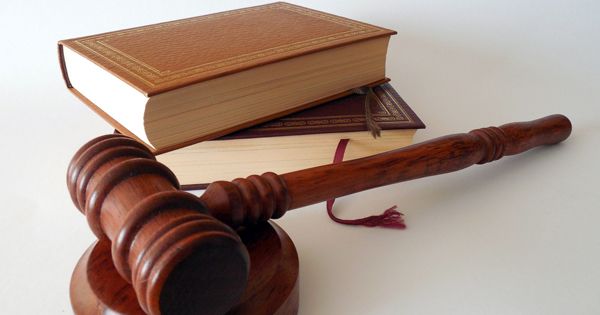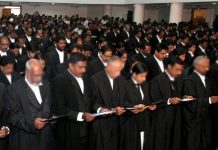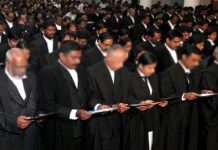This article is written by Anshal Dhiman. It talks about Right to Pre-audience as provided under the Advocates Act, 1961.
Table of Contents
Introduction
Pre-audience in general terms means the right to be heard before others. It puts the person who has the right to pre-audience above others in the same category as him so as to establish his authority. It is an important term because there are some places and offices which need to be superior to others in order to get quick decisions during the times when there is an impasse. In India, Right to Pre-audience is provided under Section 23 of the Advocates Act, 1961, which will be discussed further in the article. Merriam-Webster dictionary in its definition of ‘Pre-audience’ also writes ‘precedence at the bar among other law officers and advocates.’
This is precisely what the Right to Pre-audience does in India. It provides a superior right to those mentioned in Section 23 of the Advocates Act so as to maintain their superiority over others in India. Each advocate in India has a legal backing to practice. An Advocate is an official of the court. This status has acquired legal acknowledgment under Section 49 of the Advocates Act, which engaged the Bar Council of India to outline leads and control advocates expert direct norms. An advocate’s duty is to represent his client in the best way he can at the court, but one cannot do that if he is not given the chance to speak at the court. So an advocate while representing his client must be allowed to speak in the court of law till the moment he disturbs the decorum of the court.
Advocates Act, 1961
- Advocates Act is the legislation which regulates the conduct of advocates in India. This Act provides the rights and duties of the advocates and also the disqualifications which the advocates might get if they behave in any way as opposed by the law.
- Advocates Act is one of the most important Acts enacted in independent India. It created a group of ‘advocates’ by which every lawyer enrolled in bar is referred to as now in India, and abolished all the other terms that would have been used for advocates in absence of the Act.
- Under the Advocates Act, Advocate is defined as ‘Advocate means an advocate entered in any roll under the provisions of this Act.’ Before this Act, there were various classes of lawful professionals under the Legal Practitioners Act. They were advocates, legal counselors, vakils, and so forth the Advocates Act annulled these classes and recognized just one class of advocates. They are delegated ‘Senior Advocates’ and ‘different advocates’ on a legitimacy premise.
- Under the related provisions of the Advocates Act, 1961, Advocates just reserve the right to practice under the watchful eye of any court (vide Section 33). Albeit just advocates have the freedom to rehearse/carry on suit in courts, there is an arrangement under the Act which gives the court the ability to permit/deny any individual to show up before it.
- Thus, according to Section 32 of the Advocates Act, 1961; an individual who has not been enlisted under the Advocates Act 1961 has the freedom to show up under the watchful eye of the court however just on the ground that the court permits him to do as such.
- The status of a senior advocate is conceded by the High Court or the Supreme Court with assent of the advocate. Just an advocate who has tried out the regular roll is qualified for training in the Supreme Court or in any court, council and in whatever other body where a backer can rehearse.
- Advocates Act also provides for the setting up the Bar Council of India, which now regulates all activities of advocates, and acts as a united body of lawyers in India. Under the pertinent arrangements of the Advocates Act, 1961, advocates just reserve the option to rehearse under the steady gaze of any court (vide Section 33).
- Albeit just advocates have the freedom to rehearse/carry on prosecution in courts, there is an arrangement under the Act which gives the court the ability to permit/deny any individual to show up before it.
Right to Pre-audience
Basics of Section 23
Section 23 of the Advocates Act provides for the right of pre-audience to certain people in India. One of the significant privileges of advocates as enrolled under the Advocate Act, 1961 is the privilege of pre-audience. It is the right of being heard before another. The concept is believed to have started in English practice, under the common law system. It means people of higher ranks will be heard before those who are below them in ranks. When a court is under conflict, it follows this rule and this principle of conduct. A junior can’t address the court before a senior advocate without the permission of the latter. Right of pre-audience, an advantage conceded to the advocates which are qualified for be heard in their individual request, as indicated by the position and position. In English law, the progression of request is topped by the King’s Attorney General and finishes with counselors on the loose. Generally, barristers had privileges of audience in each court in England and Wales, and, starting in 2018, they actually appreciate the privileges of the audience in each court in England and Wales. Notwithstanding, specialists have consistently had privileges of audience in the officers’ court and the province court.
Specialists’ agents have additionally generally been permitted to be heard in procedures in chambers in the High Court, for example, summonses for bearings, and resulting changes have safeguarded these rights, The Attorney General of India, the Solicitor General of India, and the Additional Solicitor General of India have in a particular request pre-audience over any other advocates A second additional Solicitor General was consequently assigned for better arrival of government’s authentic business in India, considering comparative terms and conditions of organization as of the Additional Solicitor General and with comparative limits. It is in this manner appropriate that his privilege of pre-audience ought to be perceived in legal terms. Regarding that, a change was made in 1980 under the part 23 of the Advocates Act, to furnish the second extra specialist general with the privilege of pre audience, in prompt chain of command after the other prominent three law officials of India.
Order of priority for the right of pre audience
Section 23 of the Advocates lays down a full order of priority for the right of Pre audience in which he advocates will be qualified to address the courtroom. The privilege of pre audience is given to senior advocates, as the hierarchy may suggest, and the courts have also tended to listen to elder advocates before younger advocates. The plan of need, i.e., option to address under the watchful eye of the official courtroom, has been set down in the given order:
- Attorney General: He/she has pre-audience over all other advocates.
- Solicitor General of India
- Additional Solicitor General of India
- Second Additional Solicitor General of India
- Advocate General of any State
- Senior Advocates
- Other Advocates
The privileges of different advocates must be resolved depending on their particular rank decided as per Section 17 and 21 of the act. Yet, this assurance doesn’t influence an advocate’s entitlement to direct a case for the benefit of his customer. In spite of the fact that Senior Counsel has a privilege of pre audience over different advocates, yet on directions of the customer, the advocates showing up for a gathering can concur on an alternate decision. In any case, any such course of action doesn’t influence the legitimacy of a notification given to any direction of the gathering. After assistance of such notification, the court is cleared of its obligation to give further notification. It might likewise be seen that the arrangement simply gives a privilege of pre-audience, yet the request for pre-audience given in this segment isn’t required. The separate Counsel can defer his privilege of pre-audience for another guidance in the event that he so considers fit.
View of the Judiciary
On account of In Re: Pre-Audience of the Acting Advocate General, a request was raised by an acting Advocate General under the steady gaze of the Bombay High Court to give clear bearings to his right side of pre-audience in the concerned court. It was seen by the court that privileges of pre-audience of advocates of the High Court ought to be dictated by their status, and the Advocate General will have pre-audience or priority over any remaining advocates. Essentially, the acting Advocate General is likewise qualified for this privilege in a similar way. The constitutional legitimacy of Section 23 (5) has been tested in various writ petitions under the watchful eye of Indian courts that privilege of pre-audience given to the senior advocates over different advocates is void and illegal.
The fundamental ground of the test is that this advantage makes division/arrangement of attorneys into two classes, and manages the cost of prejudicial treatment with the pre-audience advantage given to a specific predominant class of legal counselors, planned as senior advocates. Consequently, it is violative of the balance provision under Article 14, the crucial design of the Indian Constitution and Articles 19 and 21 as well. As of late, a writ request was recorded in the event of Indira Jaising v.Supreme Court of India, testing the protected legitimacy of Section 16 and 23(5) of the Advocates Act, 1961. The arrangements accommodate the legal reason for assignment of legal lawyers as senior advocates. The 3-judge bench in the current case alluded to the writ appeal recorded before the Delhi HC in the National Lawyers’ Campaign for Judicial Transparency and Reforms and Anr. v. The BCI and anr, case where the referenced arrangements were before tested to be unlawful. Subsequently, the bench said that if the wellspring of the force of such legal assignment is itself under test, the matter is to be heard in this court. Numerous intercessions in the procedures and arrangements proposed at the bar for development in the framework, the bench honestly said that the issues concerning the assignment of legal advisors according to the pervasive methodology referenced in advocates act seem to have caused extensive disappointment among a part of the bar.
Conclusion
Right of pre-audience doesn’t occupy the minds of major thinkers in the country at the moment. It is one of those basic rights which have been adopted into professional lives just as such rules and rights are observed in daily life, because of its moral nature. But yet, it is recognized as one of the important parts of the Advocates Act which continues to regulate the actions of advocates in India. The right of pre-audience can also be adjudged as a moral right, which can be related to the years old Indian practice of respecting elders, which is now incorporated into legal practice through the right of pre-audience. Although the topic is not the most researched because of its directness, and its technicality, it still may need some referencing as to how the whole concept of pre-audience works as to why the right is necessary to have under the Advocates Act, 1961. A segment of advocates are disappointed with the specific sub section 5 and need the Apex Court of the country to pronounce it unlawful. Regardless, the arrangement is compelling and in the application as of now, so the eyes are on the Supreme Court on the off chance that it will re-think about its lawfulness.
References
- https://advocatetanmoy.com/2018/06/03/within-the-court-the-right-of-audience-of-an-advocate-is-to-be-regulated-by-the-court-itself/
- https://www.legalbites.in/right-to-pre-audience/#:~:text=Right%20of%20pre% 2Daudience%2C%20a,ends%20with%20barristers%20at%20large
- https://legislative.gov.in/sites/default/files/A1961-25.pdf
- https://www.srdlawnotes.com/2017/03/right-of-pre-audience-under-advocate.html#:~: text=Dict ionary%20meaning%20of%20Right%20of,audience%20over%20al l%20o ther%20advocates
- https://www.lawyersclubindia.com/experts/meaning-274301.asp
LawSikho has created a telegram group for exchanging legal knowledge, referrals and various opportunities. You can click on this link and join:
 Serato DJ Crack 2025Serato DJ PRO Crack
Serato DJ Crack 2025Serato DJ PRO Crack










 Allow notifications
Allow notifications


